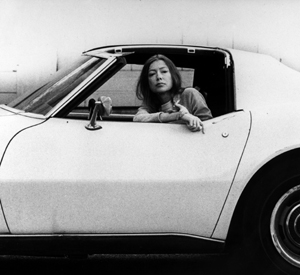 |
| Joan Didion in Hollywood, 1970 |
I never liked Joan Didion. I have yet to discover whether
this is a controversial statement or not. I’m guessing that it is, given the
amount of “Top 50”/”Top 100”/”Books to Read Before You Croak” lists her work
crops up on.
I read “Play It As It Lays” a couple of years ago and couldn’t
get into it. I found it stylistically irritating and – while I enjoyed the
flourishes of ingenious language and description that abound throughout the
book – I was unable to get beyond this.
Descriptions of characters driving into the “hard white empty core of the world,” for example,
are excellent, and showcase Didion’s talents as a true literary artist. But each
time the book is given a chance to fly, we are dragged back down into the lazy,
languid, mire of Didion’s own narcissism.
You might think narcissism
is the wrong word, that I’m being unnecessarily harsh, but I’ve thought about
this long and hard and found it to be the right word. Joan Didion’s prose is narcissistic
in that the concept of “Joan Didion” – i.e. “the author herself – is always
fully evident within it, staring back at the reader with its ironic, beatnik-ian arrogance.
I’ve read substantially
about the relationship between Didion and her late husband John Gregory Dunne –
who co-wrote the screenplay for the 1972 movie – and have spotted more
than a couple of parallels between the real life ‘Didions’ and the characters
of “Play It As it Lays”. The problem with this sort of dreary gonzo-literature
is that Didion appears to be almost legitimising the actions of a ‘Lost
Generation #2’ (or #3,#4 or whatever number we’re up to now) and denying the existence all other responsibility or obligation.
So, not to put too fine a
point on it, I didn’t like "Play It As It Lays" and I didn’t particularly like
Joan Didion as a person.
Earlier this year, I read “The
Year of Magical Thinking”. My reasoning for picking up this book was that I was
thinking about "Play It As It Lays" one day and was struck with the peculiar
thought that Didion’s self-absorbed writing style would probably translate
rather well to a memoir.
So I went out on a limb,
purchased the book with low expectations, and gave it a go. The thought process
that led me to this book must have been a form of magical thinking in itself,
as I found it thoroughly compelling from the outset.
For those who are unaware,
The Year of Magical Thinking deals with Joan Didion’s own experience of the
sudden death of her husband and its immediate aftermath. It is also grimly capoed
by the death of the couple’s daughter shortly after the book was completed, an
event which would be dealt with in a second book, “Blue Nights”.
Maybe it is the grim and
sobering subject matter of the book that finally brings Didion – now an elderly
lady – into the realms of sympathy and normality, or maybe it is that – with Didion
in this newly reflective frame of mind – the author is able to write more
candidly about her own failings and her own issues, rather than retreating into
the superficial constructions of her fiction.
In the book, Didion deals
with death head-on, often more bluntly than many of her fellow authors. Those
whose literary diet began with the stoicism of Hemingway will be fascinated by
the way that Didion’s grief is personified to such an extent that it almost
becomes an additional character in the book, as well as the way in which she accommodates
the insanity this monstrous grief brings.
Unflinching and reflective
in its portrayal of Didion’s relationships with both her husband and her
daughter Quintana over the years, "The Year of Magical Thinking" is made even
more poignant by the reader's prescient knowledge of Quintana’s imminent and
untimely death following intensive brain surgery in 2005.
"The Year of Magical Thinking" is literary redemption for Joan
Didion, in the most heartbreaking and brutal fashion.
No comments:
Post a Comment